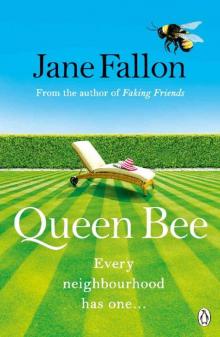- Home
- Jane Fallon
Getting Rid of Matthew Page 2
Getting Rid of Matthew Read online
Page 2
"I knew I shouldn't have told you about it," said Helen sulkily. "I knew you wouldn't understand."
* * *
The next morning, she'd waited till Matthew was alone in his office and gone in, shutting the door behind her.
"OK," she'd said.
"OK, what?" He'd looked up from his paperwork and smiled at her. She'd blushed.
"If you want to…you know…then it's OK, we can…you know…if you like. I'd like to."
Matthew had laughed. "Are you talking in code?" He'd pretended to look around the office. "Are we being bugged?"
Helen was scarlet. "You know what I mean."
"I do. And I'm very happy. Are you free on Wednesday evening?"
Helen had gulped so hard it made a noise.
"Yes."
* * *
Next thing she knew he was in her bed and all her common sense and ambition and everything she recognized about herself had gone out the window. And Helen's friends had kept saying to her, "Get out now, this can't have a happy ending," and she'd ignored them because inevitably, after a few weeks, she'd decided that she loved him and he had finally confessed that he loved her, too. And after a few months, Matthew had told her he wanted to leave his wife, Sophie, whenever the time was right. That was four years ago and he'd never even left her for a weekend, as far as Helen could remember.
Those first few months with Matthew had been fantastic, though. He was so much older than any man she'd been with before. He knew how to make her feel special. Despite the fact that they rarely went out anywhere, for fear of being seen together, he'd introduced her to all kinds of new experiences—food and music and wines that had simply never been on her radar before. And being newly in love and eager to please, she had pretended to love all sorts of things that later she was able to admit to herself she hated. Like Miles Davis and foie gras and sickly sweet Château d'Yquem.
On their fourth "date," he'd brought over a copy of Baudelaire's The Flowers of Evil and presented it to her, telling her that she would find it unlike anything she'd ever read. Helen, who had a passable 2:2 in French literature, had never told him this and, not wanting him to think his gift was unwelcome, had gushed her thanks. No one had ever bought her a book of poems before. Later, lying in bed in a post-coital flush, he'd asked her for her life history.
"Start from the beginning," he'd said, seemingly genuinely interested in the tiny details of her past. When she'd reached the part about leaving home and moving to London, she'd skipped forward rapidly through her university days but he'd stopped her midflow.
"What did you study?"
Helen could feel herself coloring up. "Er…French," she mumbled.
Matthew propped himself up on his elbows and looked down at her. "French?"
"Mmm."
He was starting to smile. "Literature?"
"Kind of."
"Kind of?"
"I mean, yes. Literature." She was blushing furiously. Why hadn't she just said, when he'd given her the book?
"So…Baudelaire…?"
"My dissertation."
Matthew laughed noisily. "Why didn't you say?"
"Because I didn't want to spoil your present."
He'd kissed her forehead. "Well, in that case, you can explain them to me, because I'm clueless. I just liked the look of the cover."
She knew he was patronizing her and she didn't know why she didn't mind. It was just that no one had ever been this interested in her before. It took the pressure off, being the one who was there to be pleased rather than the one who always had to do the pleasing. It was so liberating not to always have to be the adult.
Matthew had lived, too; he'd been through stuff—not just in a "got married and had kids" kind of way—but he'd been alive for twenty years longer than her. He'd gone through the sixties as an adult. She didn't know why this impressed her—she couldn't have been less interested in the endless bangings on of the next generation up about the sixties—but somehow it made him interesting by proxy, by virtue of just having been alive.
In the early days of their relationship, Helen had made sure she wore her best underwear on Matthew days, rushing home from the office where they both worked to give herself ten minutes to shower and change, only to be undressed again. Their evenings were all about sex, their excitement only heightened by their restricted access to one another and the extended foreplay of a day spent pretending to be no more than colleagues. Gradually sleep crept in, signaling to Helen a more mature phase in the relationship. They were bonding on a deeper level, it seemed to her, able to relax in each other's company. She stopped worrying whether she was in fancy lingerie, no longer felt the need to retouch her makeup every time his back was turned. She looked back fondly at this time as the nirvana period, that perfect stage when physical desire was joined by companionship and profound respect. It didn't last long. These days sleep often won out entirely, exhausted as Matthew always was by his high-powered working day. And more and more, Helen was finding that she didn't really mind.
After a few months, Matthew had felt uncomfortable asking Helen to take dictation or pick up his dry cleaning, so he'd requested she be found a new boss. This, of course, was interpreted by Human Resources as meaning that she was difficult to get on with or incompetent or both, and so the promotion which had been looming drifted away and Helen had missed her moment, as it were. That was three and a half years ago.
Of course, she could have left and gone to work somewhere else where she might have been more appreciated, but she'd somehow never gotten around to it and she was now officially "secretary material." Besides which, if she left, she'd miss those stolen moments with Matthew throughout the day, and deep down she knew that if she wasn't right there under his nose, someone else would probably catch his eye, eventually.
So now Helen took dictation and arranged meetings and drew up proposals for Laura, a high flying thirty-nine-year-old director of the company, who'd also started off as a personal assistant but had steadily climbed the ladder over the years. Laura was good at her job, she was a considerate boss, she encouraged and supported Helen, always gave her credit where it was due (which was often, because Helen was clever and she had a lot of good ideas, for which Laura was very grateful), and indulged her occasional mood swings. She would never for a moment consider asking Helen to fetch her dry cleaning. Helen hated her.
When she and Matthew first got together, Helen had suppressed her guilt by pushing all thoughts of his wife from her mind. She consoled herself with the thought that this was a short-term thing, to help her get over being fucked about by Simon. It was wrong, but it would be short-lived and no one would be any the wiser. After a while, when she'd realized that things had gotten a little more complicated than that, guilt had begun to set in. Tiny stabs at first, and then huge waves that had made it hard for her to look at her reflection in the mirror in the mornings. How would she feel if that were her, blithely saying good-bye to her husband as he went off to work, with no idea about the double life he was leading? It was an irrefutable truth that if no women ever went with a married man, then no wife would ever have to endure the heartbreak of finding out that her life as she understood it was a sham. As long as one woman was prepared to do it, then all women were in danger. And currently, she was that one woman.
So she knew she should call time on her and Matthew's relationship before any real harm was done, but suddenly it didn't seem so straightforward. She had feelings for him. She would miss him. Why should I be the one to give him up, she caught herself thinking one day, when it's me he's in love with? She began to feel little stings of jealousy and found herself rolling her eyes whenever Matthew mentioned his wife's name. If he noticed this change, he never mentioned it, but the word Sophie would hang in the air between them, buoyed up by an icy wind that cooled the atmosphere and started to make him feel uncomfortable. So he talked about her less and less and when he did, it would be in an exasperated and disparaging tone, a mutual enemy to be reviled and laughed
at and pitied at the same time. If Matthew felt shooting pains of guilt for this assassination of his wife—of whom he was still very fond—he never let on. And if Helen felt uncomfortable with the role she had assumed, then she buried those feelings so deeply that she would never have to acknowledge them.
2
SOPHIE SHALLCROSS WAS SITTING in her large, raised, ground-floor kitchen in her beautiful five-bedroom, two–reception room, semi-detached town house, in an up-and-coming street in Kentish Town, watching Matthew start into his pasta puttanesca and listening indulgently to the details of his stressful day, including the game of squash, with colleague Alan, which he had apparently just won. She loved hearing the minutiae of his working life, the characters and gossip and the interoffice dramas that she herself never had time for, cramming as she did a full day's work into the hours between nine and three, so that she could get home in time for the children's noisy and demanding return from school. She rested her chin in her hand, elbow on the table, and laughed when he told her how Alan had skidded and banged into the wall, then thrown his racquet across the court, as if it were to blame. After the kids went to bed—nine thirty, no later, no exceptions except for birthdays and Christmas and the odd trip to the theater—they would curl up on the sofa and have a glass of wine, her favorite time of the day.
Matthew was able to keep his life with Sophie and children, Suzanne, twelve, and ten-year-old Claudia, separated in his head from his affair with Helen. He felt no guilt. In fact, when he was at home, he barely thought about Helen at all, a fact which he thought made him a good husband and father. Actually, Matthew was pretty much incapable of ever thinking about two things at once, as most men are, so he tended to go with whatever he was presented with—if Sophie was in front of him he'd think about Sophie, if Helen was in front of him he'd think about Helen, if it was an egg sandwich…and so on. The day Helen told him she was pregnant, she had just handed him a plate of stir-fry chicken. It was as though his brain split down the middle and she could see him struggling to focus—Ooh, noodles/My life's ruined—like a dog with schizophrenia. She'd had an abortion, of course. She was the mistress.
Now, as they all sat around the table for dinner, he had no problem giving his family his full attention.
"Why are you always home so late?" Suzanne was asking inconveniently. "You're never here in time to help Mum cook dinner and she's been at work all day, too."
Suzanne had been learning about the suffragettes in year-eight history and she took her studies very seriously.
"Don't talk shit," said blissfully unemancipated Claudia—who had also just learned about swearing, in the playground of Kentish Town Juniors, and liked to practice at every opportunity. "Mummies do the cooking."
"Don't say shit, Claudia," Matthew jumped in.
Sophie picked up her cue. "You know I get home at three thirty and Dad's never here till after eight, he works much longer hours than me."
"That's my point, exactly," triumphed Suzanne.
This was a pretty representative dinner table conversation at the Shallcross household. Like most families, they could play their roles on autopilot.
Although Sophie had assumed the traditional role of caregiver to her family, she was anything but an average housewife. She'd got a first from Durham for a start. In maths. She had a career in the city doing something unexplainable, where she earned a small fortune—more than Matthew, as it happened—and where she was so indispensable that she was able to arrange her hours to suit herself. Truthfully, she did it because she wanted to, not because she felt she had to. However hard she'd worked or however high she'd gone, Sophie had always put family life first. Never mind that she got up at six, dressed in a suit, oversaw Suzanne's and Claudia's preparations for school, packed their lunches, walked them to the end of the road, got on the tube, rarely took a proper lunch break, got back on the tube, helped the girls with their homework, made dinner from scratch—no ready meals in this household—loaded the dishwasher, sorted out everyone's clothes for the next day, and tried to stay awake long enough to offer Matthew some adult chat and a sympathetic ear for his problems at the office. There'd been little or no time for anything else for the past twelve years—no exercise classes or drinks with the girls. Recently, she had been passed over for a promotion because she was never in the office when the West Coast kicked in. But she had an absolute faith in the love and stability of her family and for Sophie that was worth a few sacrifices.
This evening panned out just like any other evening. It was two weeks to Christmas, and Matthew and Sophie had to decide what to get the girls while still avoiding the things they knew they wanted: makeup, high-heeled shoes, dogs, and miniskirts. Then there was the question of who was arriving when and who was sleeping where. Christmas at the Shallcross house was always a full-blown family affair, with Matthew's mother, sisters, and the sisters' husbands and children.
"Gerbil for Claudia?" Sophie asked, knowing what the answer would be.
"No."
"Hamster? Guinea pig? Rat?"
"No, no, and no. No pets, we agreed."
"OK. I'll think of something else. Oh, and we need to get the box of decorations down."
"I'll do it on the weekend."
"And a tree."
"Weekend."
"And order the turkey."
At about ten thirty, and a bottle of Sancerre down, Matthew felt an uncharacteristic twinge of sentiment about Helen and what, through the hue of his sixth glass, seemed to him to be the uncomplicated nature of his other life with her, uncluttered by family and duty. He sneaked off to the study—doubling up as a children's bedroom for the Christmas period—and dialed her number. Helen, who was tucked up in bed asleep, feigned indifference, although a late-evening phone call was a real event. Matthew found himself promising to come over on Tuesday in lieu of Thursday, which was the day of daughter Claudia's Nativity play. Helen tried to give the impression that she might not be free, but couldn't keep it up. It was all over in less than three minutes and everybody was happy.
In the tastefully deep red living room with original coving and architraves at number 155 Bartholomew Road, Sophie yawned and stretched and started to tidy away the lists that she had made. She slipped her arms around Matthew's broad back and kissed the base of his neck, her favorite place, where the gray wispy hairs curled flat against it like a baby's.
"Amanda and Edwin have invited us over for a pre-Christmas drink on Tuesday, can you bear it?"—Amanda being the elder, and slightly more annoying, of Matthew's two younger sisters.
"If I must." Matthew turned around, kissing her back.
"I've said we'll be there at seven, can you get away early?"
"No problem," he said, entirely forgetting the promise he'd made to Helen only forty minutes ago. "I'll come home first and pick you up."
3
LYING IN BED, Helen replayed the phone conversation in her mind, looking for hidden clues. There had been only a handful of occasions over the years when Matthew had agreed to see her outside the appointed times. She wondered what had prompted it. Maybe a row with Sophie, she thought hopefully. Although she'd never met her, Helen wasn't stupid—she knew that Sophie couldn't really be the unattractive, gray-haired, past-her-sell-by-date, baby-making machine she liked to imagine on lonely Monday, Wednesday, and Thursday nights after Matthew had left to go home, or else why would he have married her? More to the point, why would he still be married to her all these years later? If he'd rather be with Helen, as he always said he would, then why wouldn't he just stay the night and fuck what Sophie thought. That was…unless…
Stop! Helen dragged herself out of bed in an effort to think about something else. She pulled on a pair of baggy pajama bottoms and a T-shirt, walked through to the living room, and picked up the phone to call Rachel for the usual debriefing. Helen could always rely on Rachel to help her get things into perspective. Even if she was in the pub or on a date, Rachel would drop everything to indulge Helen's whining. Because tha
t's what friends were for. Rachel was more successful than Helen, more beautiful, better off, but—and it was a big but—she was single. She had no man of her own—not even a time-share in one like Helen, and that, Helen couldn't help but think—and it was a thought she wasn't proud of and would never dream of voicing out loud—put her lower down in the female pecking order.
Their conversations usually went something like this:
"Do you think he still sleeps with her?"
"No, of course he doesn't."
"How can you be so sure?"
"He hasn't found her attractive in years, hasn't he told you that loads of times?"
"Yeah, but do you think he means it? Why's he still with her, then?"
Then Rachel would run through her repertoire of stock answers:
"Maybe she's threatened to kill herself if he ever leaves her. Or she's got a terminal illness and he figures he should just wait it out. Or she's loaded and he needs to find a way to get her money before he can go. Or she's psychotic and he's afraid of what she might do."
They never reached any conclusions. And, of course, Rachel never said what she really thought, which was "What is wrong with you? Obviously he still loves her, what are you wasting your time for?", so Helen always came away from their chats having somehow convinced herself that Matthew really was trapped in a loveless relationship, just waiting for the right moment to end it all and move in with her.
Helen had often fantasized about somehow letting Sophie know what exactly her husband did with his evenings. In her favorite fantasy, a distraught (and, frankly, ugly) Sophie threw Matthew out into the street without even a hope of a reconciliation, but Matthew, far from being upset, was relieved that he could finally live the life he'd wanted for the past four years. It tended to go on that he bought a big and beautiful home in the country, set Helen up as the boss of a small company making hand-turned pots (in her fantasies, Helen was always proficient in skills she had, in reality, never even tried). Conveniently, Matthew forgot all about his already existing offspring.

 Queen Bee
Queen Bee Tell Me a Secret
Tell Me a Secret Worst Idea Ever
Worst Idea Ever Strictly Between Us
Strictly Between Us My Sweet Revenge
My Sweet Revenge Foursome
Foursome Getting Rid of Matthew
Getting Rid of Matthew The Ugly Sister
The Ugly Sister Faking Friends
Faking Friends